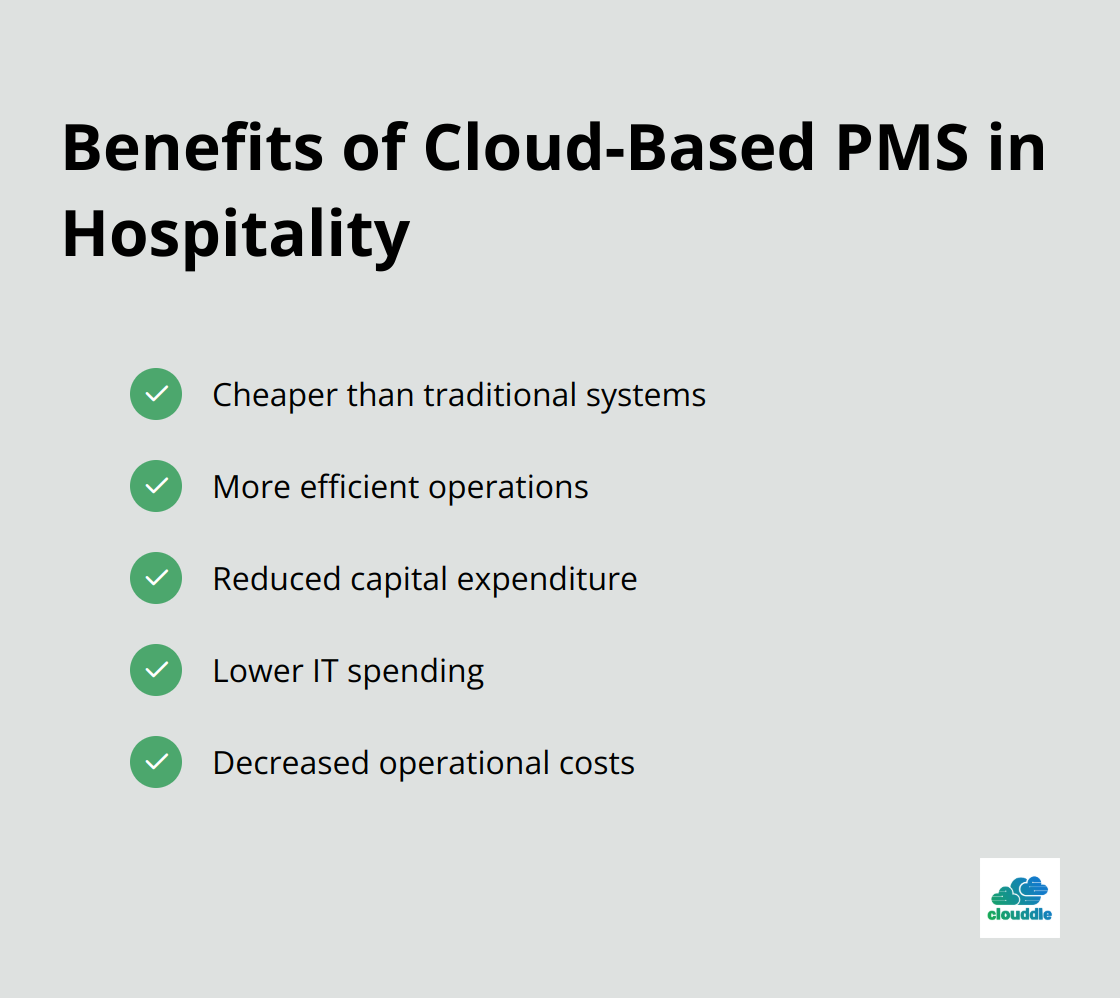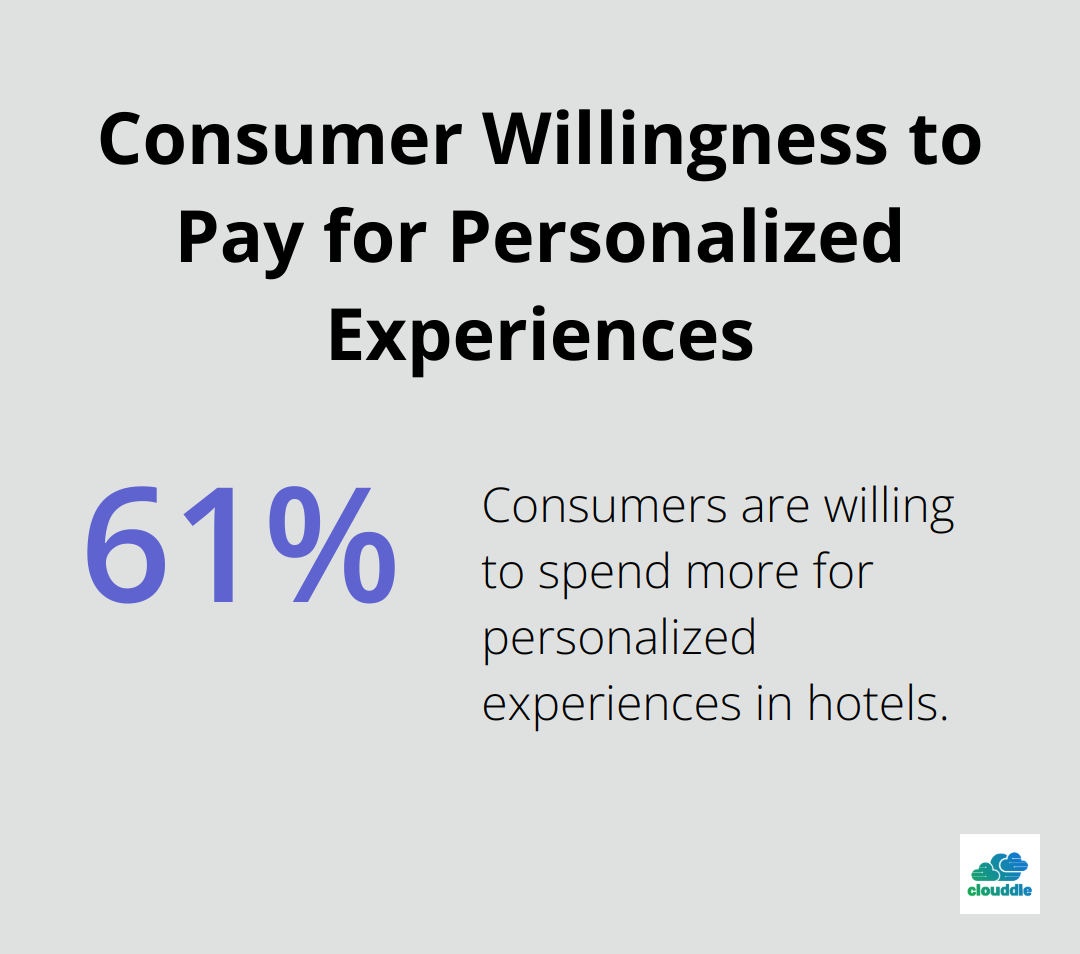The importance of information technology in the hospitality industry has skyrocketed in recent years. From streamlining operations to enhancing guest experiences, IT has become the backbone of modern hotels and resorts.
At Clouddle, we’ve witnessed firsthand how technology is reshaping every aspect of hospitality. This blog post explores the evolution of IT in the industry, key solutions driving change, and the challenges and opportunities that lie ahead.
How IT Has Transformed Hospitality
From Manual Processes to Cloud-Based Systems
The hospitality industry has experienced a dramatic transformation due to the rapid advancement of information technology. What began as basic reservation systems has evolved into sophisticated, integrated platforms that manage every aspect of hotel operations.
In the early days, hotels relied on manual processes for bookings and guest management. Today, cloud-based Property Management Systems (PMS) have revolutionized the industry. These systems allow hotels to manage reservations, check-ins, room assignments, and billing from a single platform. Cloud-based PMS solutions are cheaper and more efficient than traditional ones, with reduced capital expenditure, IT spending, and operational costs.

Mobile Technologies Enhance Guest Experience
The rise of mobile technologies has significantly impacted how guests interact with hotels. Mobile check-in and digital room keys have become increasingly common, with major chains like Hilton and Marriott leading the way.
Data-Driven Decision Making
IT has also transformed how hotels make operational decisions. Advanced analytics tools allow managers to track occupancy rates, revenue per available room (RevPAR), and guest preferences in real-time. This data-driven approach enables more accurate forecasting and personalized marketing strategies.
Seamless Connectivity and Security
Modern hotels require robust network infrastructure to support the increasing demand for high-speed internet access and connected devices. Solutions like Network as a Service (NaaS) combine networking, entertainment, and security services, allowing hotels to offer seamless connectivity without large upfront investments.
Emerging Technologies Shaping the Future
The evolution of IT in hospitality continues, with emerging technologies like artificial intelligence and the Internet of Things promising even more transformative changes. Hotels that embrace these innovations will be better positioned to meet the evolving expectations of tech-savvy guests and maintain a competitive edge in an increasingly digital marketplace.
As we explore the specific IT solutions driving change in the hospitality industry, it becomes clear that technology has transformed the guest experience and hotel operations, becoming an indispensable tool for success in this dynamic sector.
IT Solutions Reshaping Hospitality
The hospitality industry experiences a technological revolution, with several key IT solutions leading this transformation. These innovations enhance operational efficiency and fundamentally change how hotels interact with guests and manage their properties.
Property Management Systems: The Digital Backbone
Property Management Systems (PMS) function as the central nervous system of modern hotels. These comprehensive platforms integrate various aspects of hotel operations, from reservations and check-ins to housekeeping and billing.
Modern cloud-based PMS solutions offer real-time updates across departments, which enables staff to respond quickly to guest needs. For example, when a guest checks out, the PMS immediately notifies housekeeping to prepare the room for the next arrival, which significantly reduces turnaround times.
CRM Tools: Personalizing the Guest Experience
Customer Relationship Management (CRM) tools revolutionize how hotels understand and cater to their guests. These systems collect and analyze guest data to create detailed profiles, which enables personalized services that can significantly boost guest satisfaction and loyalty.
A recent study found that 61% of consumers are willing to spend more for personalized experiences. CRM systems allow hotels to track guest preferences (from room type to dining habits) and use this information to tailor services. A hotel might automatically prepare a hypoallergenic room for a guest with known allergies or offer a favorite wine upon arrival.

Robust Wi-Fi: A Non-Negotiable Amenity
In today’s connected world, reliable and fast Wi-Fi is no longer a luxury-it’s a necessity. A survey by Hotels.com revealed that 49% of business travelers consider free Wi-Fi the most important factor when choosing a hotel.
Advanced network infrastructure solutions now allow hotels to offer seamless connectivity throughout their properties. This includes high-speed internet in guest rooms, public areas, and even outdoor spaces. Some hotels take this a step further by implementing IoT devices that allow guests to control room features like lighting and temperature through their smartphones.
Cybersecurity: Protecting Guest Data and Trust
With the increasing reliance on digital systems, cybersecurity has become a critical concern for hotels. The hospitality industry is a prime target for cyberattacks due to the vast amount of sensitive guest data it handles.
A report by Verizon found that the accommodation sector accounted for 13% of all data breaches in 2019. To combat this, hotels implement advanced cybersecurity measures such as end-to-end encryption, multi-factor authentication, and regular security audits.
Moreover, with the introduction of regulations like GDPR, hotels must ensure they comply with data protection laws. This includes implementing proper data handling procedures and providing guests with control over their personal information.
These IT solutions are not just add-ons but essential components of modern hospitality. Hotels that fail to adopt these technologies risk falling behind in an increasingly competitive and tech-driven industry. The next challenge for hoteliers will be to balance these technological advancements with the human touch that remains at the heart of hospitality. This balance between technology and personal service presents both challenges and opportunities for the industry, which we will explore in the next section.
Navigating the IT Landscape in Hospitality
The Human Element in a Digital World
Technology streamlines operations, but exceptional service defines hospitality. Hotels can centralize their systems using cloud-based solutions, making it easier to manage bookings, guest preferences, and loyalty programs. This allows staff to focus on providing personalized experiences and anticipating guest needs.
Cost Management and Competitive Edge
IT solutions require investment, but they’re essential for competitiveness. The hospitality market grew to $4.9 trillion in 2024, with the industry’s GDP impact hitting a record $11.1 trillion. Hotels should prioritize technologies that offer the highest return on investment. Cloud-based solutions often provide scalability and reduced maintenance costs compared to on-premises systems.

Bridging the IT Skills Gap
Rapid technological change has created a significant skills gap in the hospitality industry. Hotels partner with tech companies and educational institutions to develop training programs. Some implement mentorship programs where tech-savvy employees guide colleagues in using new systems.
Harnessing Data for Strategic Decisions
Data analytics offers hotels the opportunity to make informed decisions. However, many struggle to use the wealth of data effectively. Hotels should focus on key performance indicators (KPIs) that align with their business goals. Analysis of guest feedback data can help identify areas for service or amenity improvement.
Cybersecurity in the Spotlight
Hotels collect more guest data, making them prime targets for cyberattacks. Hotels must prioritize cybersecurity measures, including regular staff training on data protection protocols and implementation of multi-factor authentication for all systems.
Final Thoughts
The importance of information technology in the hospitality industry continues to grow. IT has become the backbone of modern hotels, reshaping operations and guest experiences through cloud-based systems, advanced analytics, and personalized services. We expect further advancements in AI, IoT, and VR to create more immersive guest experiences, while the need for robust cybersecurity measures will increase to protect guest information and maintain trust.
Hotels must balance technological innovation with the human touch that defines hospitality. Those who successfully leverage the right IT solutions and partnerships will enhance operational efficiency, deliver personalized experiences, and stay ahead in this competitive industry. The future of hospitality is inextricably linked with technological innovation, and hotels that embrace these changes will be better positioned to meet evolving guest expectations.
At Clouddle, we offer technology solutions tailored for the hospitality industry. Our Network as a Service (NaaS) combines networking, entertainment, and security services, allowing hotels to provide seamless connectivity without large upfront investments. With our support, hotels can focus on what they do best – providing exceptional guest experiences in an increasingly digital marketplace.


